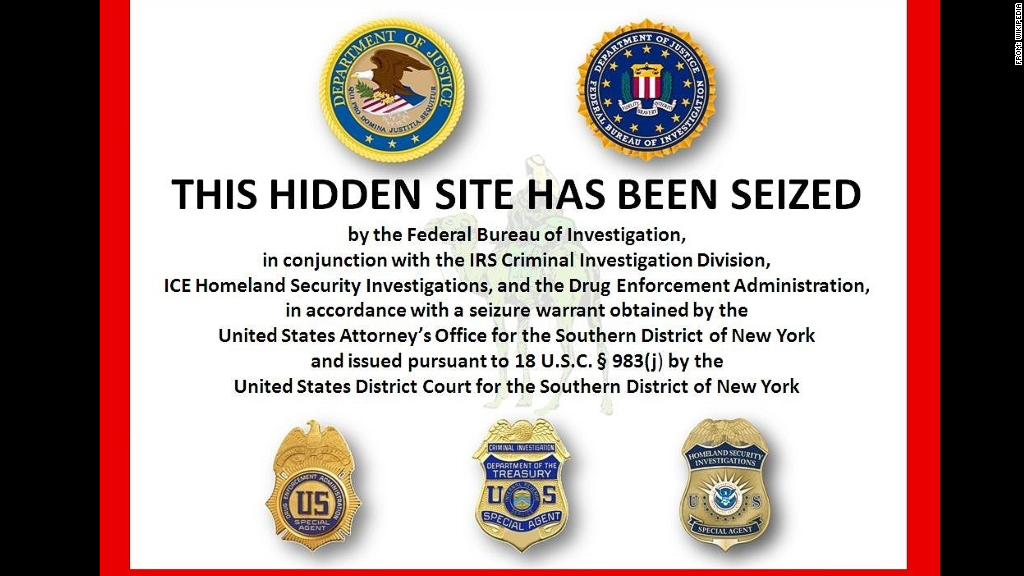
The FBI has shut down the online drug bazaar Silk Road -- and arrested the man who they say created it.
According to the sealed complaint filed by the FBI, federal agents arrested Ross William Ulbricht on Tuesday afternoon, charging him with narcotics trafficking, computer hacking and money laundering.
The FBI also seized the Silk Road website, replacing its homepage with a banner noting as much, according to agency spokeswoman Kelly Langmesser.
Since its 2011 inception, Silk Road has been the go-to black market for all sorts of illegal products and services. Its draw? The online marketplace offered an easy way to find goods and services -- and transact the money in secret. The site had 957,079 registered users, according to the FBI.
"Based on my training and experience, Silk Road has emerged as the most sophisticated and extensive criminal marketplace on the Internet today," FBI Special Agent Christopher Tarbell said in the complaint.

The site was operated on an anonymous network known as Tor, making activity on Silk Road virtually untraceable. The only money accepted on Silk Road was the digital currency bitcoin, adding an additional layer of anonymity to buyers and sellers.
The use of bitcoin helped Silk Road become a giant money laundering operation, according to the FBI. To process bitcoin transactions, Silk Road used what the FBI described as a "tumbler," a complex system that used countless dummy transactions to digitally conceal where the money came from.
Over the past two and a half years, the FBI said the site generated revenue worth more than 9.5 million bitcoins -- valued at $1.3 billion early Wednesday.
The FBI said Ulbricht's net worth was essentially his value in Silk Road's commissions, which totaled more than 600,000 bitcoins ($85 million).
News of the federal bust slammed the value of bitcoins on Wednesday, which tumbled from a high of $141 to below $120.
Silk Road wasn't restricted to illegal drugs. The FBI says it was also used to trade firearms, hire assassins and employ hackers.
In its Sept. 27 complaint, the FBI detailed how undercover agents used Silk Road to buy ecstasy, cocaine, heroin and LSD. They also purchased hacking software from more than 100 users. The FBI also tracked down several of Silk Road's computer servers, including one in a foreign country.
Related story: Bitcoin ATMs coming soon
To catch Ulbricht, the FBI intercepted communication sent from his account. One string of messages showed that someone in Canada tried to extort Ulbricht for $500,000 and threatened to expose several Silk Road users. In response, Ulbricht paid $150,000 to have him killed, the complaint stated. However, Canadian police told the FBI they could not locate a record of any homicide matching the name, date and location alleged in the secret discussions.
According to the complaint, Ulbricht's carelessness allowed FBI agents to track him down. The FBI said someone using the name "altoid" mentioned Silk Road in its earliest days within the online forum bitcointalk.org. "Altoid" then reappeared months later, this time looking for an "IT pro in the Bitcoin community." The contact information: a Gmail address with Ulbricht's full name.
Ulbricht was arrested at the Glen Park branch of the San Francisco Public Library at 3:15 p.m. PT on Tuesday.
In its raid, the FBI seized bitcoins valued at approximately $3.5 million, Langmesser said.
In its complaint, the FBI claims Ulbricht was the infamous "Dread Pirate Roberts" who created Silk Road. A person under that pseudonym agreed to speak to Forbes in August about the site and the vision behind it: creating a digital world that exceeds the grasp of government taxes and laws.
The FBI had worked on shuttering Silk Road and tracking down its creator since late 2011. For the investigation, the FBI teamed up with the IRS, Drug Enforcement Administration and an investigative unit of the Department of Immigration and Customs Enforcement.

